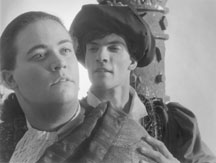Opera SJ Handels 'Xerxes'
Royal Miscreant: King Xerxes (John Bellemer) and Arsamene
(Martin Phillip) plot some Baroque mischief in ancient Persia.
Local company's new production of Handel's comic opera is part of national Baroque revival
By Philip Collins
OPERAS ABOUT unkind tyrants are plentiful, but only in the Baroque theater are the perpetrators likely to get away without so much as a slap on the wrist. In Handel's serio-comic opera Xerxes, for example, the manipulative title character's only comeuppance for innumerable cruelties is marriage--to his betrothed, no less. His reprehensible acts are absolved, and all is wrapped up in a nifty second, faster than you can say "Gilbert and Sullivan."
"Finally the knot has to be untied, and everybody lives happily ever after," says Daniel Helfgot, director of Opera San José's season-opening production of Xerxes. "It's as if to say, 'We all make mistakes and life goes on.' "
Xerxes, after years of neglect, is suddenly receiving a number of revivals. More unorthodox than that of most companies, Helfgot's staging treats the story of ancient Persia as a play within a play, and the audience will see characters slip in and out of their 18th-century guises as they are called upon to participate in the performance of Xerxes' story.
"They referred to operas during Handel's day as 'entertainments,' and we're bringing that element to our production by looking at Persia through the eyes of the Baroque," explains Helfgot. "In the Baroque [era], the flavor of 'orientalia' encompassed everything between the Nile and the Great Wall. We're presenting it like a court entertainment."
Helfgot believes that it will only be a matter of time before Handel's theatrical virtues are properly appreciated. "Only some years back, Mozart was believed to be for erudites. Now he is a popular household name." Helfgot points out that much of Mozart's shrewdness is anticipated in Xerxes.
Handel composed 40 operas (48 if you count the unpublished ones). He is celebrated--particularly in professional circles--as the most visionary and accomplished composer for the musical stage before Mozart. And yet opera fans are largely unfamiliar with Handel's dramatic works other than Julius Caesar and Orlando.
"When you consider that Mozart was born before Handel died, you realize that the two composers were dealing with the same approach to theater," notes Helfgot. As an example, he cites the influence of Xerxes on the first finale from The Marriage of Figaro, as well as the end to Don Giovanni.
"Mozart didn't invent, he imitated and extended," says Helfgot. "It's amazing to see how intelligently Handel crosses over from drama to comedy, then back again. His subtleties of tempo move the moods back and forth. Baroque operas were either serious or comic, but in Xerxes Handel explores the world between."
Handel's score facilitates the plot's dizzy intrigues seamlessly. And with a poker face, most of the time. While the principal characters' sincere emotional needs come first, Handel is ever ready with the seltzer bottle. Helfgot credits the fluid expressiveness of Handel's arias for giving the opera its dramatic elasticity.
"Xerxes is one of the first times in opera literature when the whole story could be told through arias," Helfgot says. "Baroque opera usually offers arias that are not tied together very well. In Xerxes, the arias alone are sufficient in terms of character development and relationships." Which is a good thing, because the story of Xerxes is more twisted than a roller-coaster ride.
Mostly, the plot revolves around King Xerxes' obsession over his brother Aramene's beloved, Romilda. Xerxes' multiple abuses of the law to steal Romilda's affections include ordering his brother's banishment and arrest, among other things. But nothing works. Xerxes winds up marrying his betrothed, Amastre, and Aramene finally gets together with Romilda. There are other characters in the stew, particularly Atlantis, Romilda's sister, whose efforts to win Armene's affections are as grievous as Xerxes' treacheries.
The opera's most memorable character, however, is the bumbling but well-meaning servant and deliverer of messages, Elviro, who lubricates the opera's unfolding and lightens up its more severe climates. "He's the entertainer-type of character that makes the bridge between the audience and the rest of the plot," says Helfgot.
BAROQUE OPERA has suffered virtual neglect this century, and certainly, a resurrection of its rich repertoire is long overdue. Helfgot's hopes for Xerxes are bolstered by the company's highly successful 1991 production of L'ormindo by Pietro Francesco Cavalli, Handel's elder contemporary.
"L'ormindo was one of our most popular productions," Helfgot recalls. "People were surprised how much they liked it. However, we're exploring the Baroque repertoire because it is artistically worth doing, and also because the ensemble quality of the literature is appropriate for our company. It's artistic and practical for us to do it."
[ Metro | Metroactive Central | Archives ]
This page was designed and created by the Boulevards team.

Scott Hinrichs
Xerxes plays Sept. 14, 17, 1921, 24, 26 and 28 at 8pm and Sept. 15, 22 and 29 at 3pm at the Montgomery Theater, Market and San Carlos streets, San Jose. Tickets are $33$42. (408/437-4450)
From the September 12-18, 1996 issue of Metro
![[Metroactive Stage]](/stage/gifs/stage.gif)